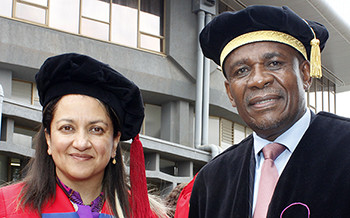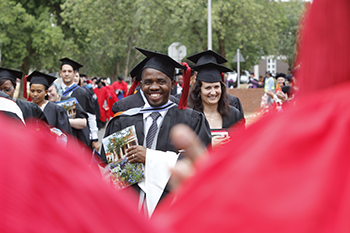
Dr Ferial Haffajee, editor-at-large at The Huffington
Post SA, who was conferred with an honorary doctorate,
and Dr Khotso Mokhele, the Chancellor of the
University of the Free State at this year’s Summer Graduation.
Photo: Eugene Seegers
“A graduation ceremony epitomises every student’s academic dream and pursuit, and allows you to look back as you enter the professional career of your choice.”
These were the words of guest speaker Dr Mafu Rakometsi, Chief Executive Officer of Umalusi, that resonated through the Callie Human Centre at this year’s Summer Graduation on the Bloemfontein Campus. He mentioned that today graduates would look back at a journey that started with hesitant steps, and despite all their ups and downs, they had managed to make it this far.
During the afternoon session, Prof Lis Lange, Vice-Rector: Academic, at the University of the Free State (UFS), said that graduations were always an occasion for celebration and this year, there were two reasons for these celebrations.
“The first is simply that we made it through a difficult 2016 and the secondly because we are celebrating two crucial professions that will attribute to the well-being of this country, namely teachers and health practitioners.”
Meaningful graduation ceremony for Ferial Haffajee
This year, the UFS had the privilege and honour to confer editor-at-large at The Huffington Post SA, Ferial Haffajee, with an honorary doctorate in the Faculty of the Humanities.
Speaking after the graduation ceremony, Dr Haffajee said, “It was really, really meaningful for me, because I’ve never been able to graduate. When I finished university, it was during the struggle against apartheid, so we didn’t graduate. It was a wonderful day and wonderful to see the role that young people are playing on this campus.”
“Dr Ferial Haffajee has made a significant contribution to press freedom in South Africa. She is known both nationally and internationally for the work she has done and therefore it is an honour to welcome her as a Kovsie. She is one of the people who represent the values of the UFS. We are proud of her and we wish her great success,” said Prof Milagros Rivera, Head: Department of Communication Science and acting Dean of the Faculty of the Humanities at the UFS.

Photo: Johann Roux
Inspiration drawn from graduation ceremonies
During his address, Dr Khotso Mokhele, the Chancellor of the UFS, made special mention of many that inspired him at the graduation ceremonies.
His inspirations included Dr Ambrotius Swartbooi, who suffered a spinal injury from a near-fatal car accident which left him paralysed and a quadriplegic, yet who still managed to receive his doctorate; Setsoane Ntseki, a matriculant with poise and an incredible voice, who delivered the song item; Judge Ian van der Merwe, Chairperson of the Council at the UFS and a close friend of Dr Mokhele, with whom he worked for many years; as well Dr Haffajee, a trail-blazer that many look up to.
Damian Viviers was recognised as one of the youngest PhD graduates in the Faculty of Law, where he received a PhD in Mercantile Law. He is a research fellow in the Department of Mercantile Law, and was recently appointed as candidate attorney in the commercial department at Phatshoane Henney Attorneys.
In closing, his message to the class of 2016 was simple, that even though the world and our country may find itself in an odd space now, the graduates needed to remember that even though they would become leaders, there was always something bigger than themselves.
“Go out there and do us proud. Come back and plough back into this institution not only with your money, but your skills and time too.”